You are here
Institute for Defence Studies and Analyses and Bangladesh Heritage Foundation visit to Agartala
To commemorate Bangladesh’s 40 years, Institute for Defence Studies and Analyses (New Delhi) and Bangladesh Heritage Foundation (Dhaka) held a three day dialogue in Tripura (16-18 May 2011) which holds special significance with reference to the events of December 1971 and the Bangladesh Liberation War. As is well known, the first Bangladesh government in exile was formed in Agartala, apart from the first Bangladesh Radio office being set up here. IDSA delegation led by Dr Arvind Gupta included Amb JC Sharma, Dr Smruti Pattanaik and Dr Sreeradha Datta. Amb Wali ur Rahman of Bangladesh Heritage Foundation (BHF) led the Bangladeshi team that comprised Prof Daler Barman and Prof Abdul Mannan.
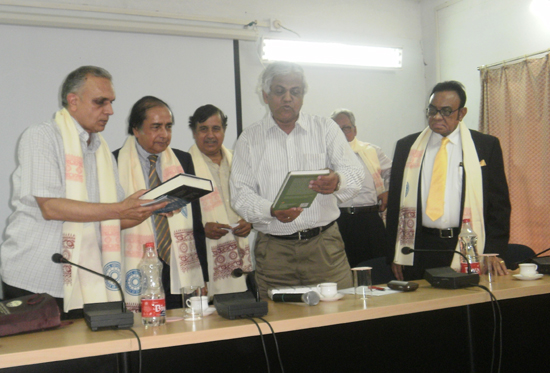
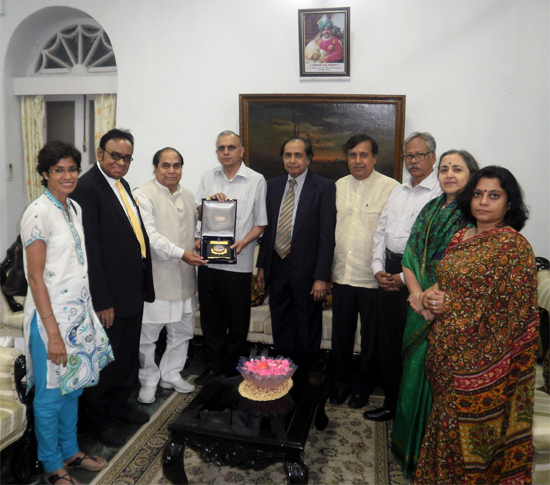
Spread over three days, the two delegations participated in a number of activities, beginning with a half day interaction with the Tripura University. The Vice Chancellor, Prof Arunodaya Saha, in his introductory remarks, refereed to Tripura’s role in the Bangladeshi Liberation War and subsequently discussed the present state of bilateral issues between the two sides. The Bangladeshi delegation expressed their gratitude about the sacrifice that India and Indian soldiers made to ensure independence of Bangladesh and also reminisced the importance of Tripura in that historic event. The delegation also called upon the Governor His Excellency D Y Patil and exchanged views on the strides Tripura had taken to improve the Indo-Bangladeshi bilateral relations.

On the second day, the delegation visited the Bharat-Bangladesh Maitree Udyan park, Chottakhola, Belonia. Chottakhola a border town 130 km from Agartala was one of the base camps of the Muktijuddhas (Bangladeshi freedom fighters) from where they launched the war against Pakistani troops in Noakhali, Feni and parts of Comilla districts. Surrounded by Bangladesh, the Tripura government to commemorate the 40th year of Bangladesh’s independence has also decided to build an eco-park at Chottakhola, including a statue of the Bangabandhu, the architect of Bangladesh's independence Sheikh Mujibar Rehman. Located near the Indo-Bangladesh border the Bharat-Bangladesh Maitree Udyan Park (India-Bangladesh Friendship Park) will be a tribute to Indian soldiers and Bangladeshi freedom fighters who sacrificed their lives during the Liberation War. A museum will also be built showcasing the arms and ammunitions used in the war, along with photographs, literature and newspapers from that period. The Bangladeshi foreign minister Dipu Moni had laid the foundation stone of the Bharat-Bangladesh Maitree Udyan in 2010. This park to be built over 20 hectares will have an entrance that will represent the rich cultural heritage and links that exist between India and Bangladesh. The seven hillocks and slopes will be landscaped with different types of vegetation special to this region that would be planted and maintained to provide livelihood to the local population with the growth of floriculture and allied income generating activities. This park nests within the extensive Trishna Wild Life Sanctuary, also home to the Bison Conservatory Reserve forest.
Along with the restoration of the Old Mosque located on the Ekinpur Dimatali Indo—Bangladesh Border, this area has immense tourism potential. The untapped tourism potential in this region was brought to the attention of this group by Manik Sarker, Chief Minister of Tripura, when they called on him on the last day of their visit. He stressed upon the need for a concerted effort to ensure that Bangladeshis and Indians alike were given the scope to enjoy the fascination flora and fauna of this region. Mr. Sarkar emphasised the love and affection Bangladeshis have towards people from Tripura. This predates the 1971 liberation war and is relevant even today. It was clearly evident in his recent visit to Bangladesh, according to the honourable Chief Minister. He stressed that the cultural and social links between Tripura and Bangladesh have had more binding and enduring influence than any other factor in the bilateral ties.
Tripura’s 856 km. long border with Bangladesh brings it in close proximity with several Bangladeshi districts; Agartala is 150 km from Dhaka; similarly Kailashahar and Sylhet are only 90 km apart; Sabroom¬ and Chittagong at 75 km; Sonamura and Comilla at 25 km. Kolkata–Agartala distance through Bangladesh stands at 350 km as against 1857 km through the West Bengal- Assam route. Therefore, once the decisions taken during the Prime Minister of Bangladesh, Sheikh Hasina’s visit to India in January 2010 are implemented, Tripura will be more closely linked with Bangladesh than other northeastern states of India. In addition, Bangladesh is slated to provide India access to Chittagong Port for movement of goods to and from India through road and rail. The rail link between Agartala and Gangasagar in Bangladesh will be linked up to the Lumding (Silchar, Assam) railway line that became operational from 2008 ensuring that transit through Bangladesh becomes reality. The Agartala-Dhaka bus service has taken off very well. Along with this, more transport links between Tripura and Bangladesh will be developed soon.
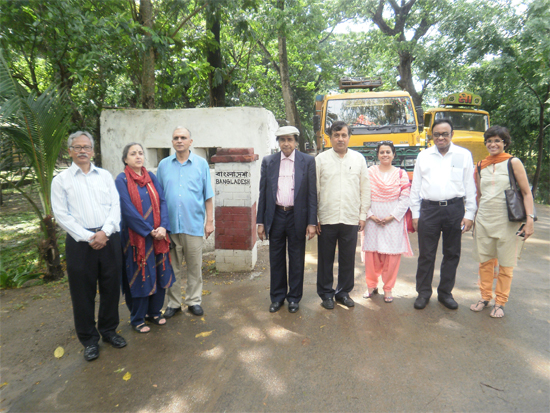
The delegations also visited Kailashahar, Border Outpost that overlooked the Bangladesh railway line which would soon join with the Tripura line and is likely to be changed from meter gauge to broad gauge within 2012. The delegations were also briefed by the Border official about the state of law and order in this sector and the prevailing peaceful conditions on the border. The Mata Sundari temple on the border was an added attraction for Bangladeshis too.
Tripura has 7 designated Land Custom Stations, and the Agartala Akhaura Land Custom Station is only about 75 km. from the Chittagong Port. With official trade growing four times in the last five years to reach Rs. 300 Crores, Tripura is the only northeastern state to have a growing deficit with Bangladesh. Given the large infrastructural development that is taking place within Tripura, it is importing a large quantity of stone chips, bricks besides fish on a daily basis. However the issue of trade gap should not be viewed through a narrow prism but seen in the context of the growing trade and commerce between Tripura and Bangladesh. This bilateral visit also coincided with the inauguration of the Akhaura integrated check post (ICP) which will be expanded from the presently functioning land custom station. This decision was taken during the Indo-Bangladeshi joint communiqué signed in January 2010. With the new connectivity routes that need to be operationalised soon, this ICP has the potential to be one of the largest trading points in this region. The plan to sell power from Tripura, Palatana plant will be very beneficial to Bangladesh and CM was sanguine about viability of many more such ventures in the region. The 250 MW of electricity that Bangladesh would receive from across the border was made possible with the availability of Ashugunj Port through which Over head Dimensional Cargo required for the plant was brought in from Kolkata.
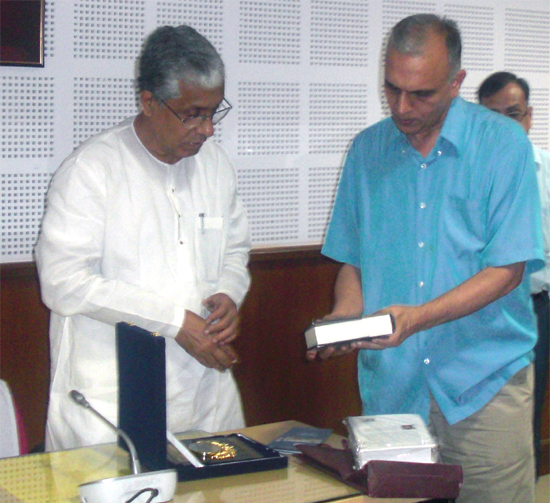
The CM was keen to open Tripura-Bangladesh border haats on the lines that has been planed for Meghalaya. This would not only be beneficial to the people living close to the border but also address the criminalisation of the area and improve the law and order conditions. However incidents of border firing were creating unfriendly bilateral atmosphere. Given the prevailing cross border smuggling, Indian border forces often resorted to this but there is an urgency to sensitise the forces to this issue and be given training deal with the problem differently thereby reducing causalities completely. The senseless firing has to be stopped and with immediate effect argued the CM. The inimical forces in Bangladesh would be looking for such opportunities to create a wedge between the two friendly neighbours. He, therefore, cautioned against such forces but was confident that quick implementation of all the joint communiqué decisions would ensure the failure of any ill intentions.
Manik Sarker was hopeful of Indo-Bangladeshi ties deepening in years to come and wished that the Centre initiated and opened more avenues for both New Delhi as well as for the entire northeast region specially Tripura to expand its cross border trade and connectivity linkages.
In the delegations’ visit to Agartala-Akhaura border, both sides interacted with the border officials from both sides as well the custom official and were given a brief tour of the area that would soon house the ICP. The delegation was also given a detailed briefing by Assistant District Magistrate, Avishek Chandra, Udaipur on the state of law and order and governance in Tripura. With the wearing down of the militancy problem, the developmental goals of the state have been successfully implemented. The state has been able to make use of various centrally sponsored schemes (egs, MNAREGA, PM GSY, SSA etc). Tripura has also been able to attract investments by taking advantage of the 100 percent freight subsidies offered to the north-eastern states, and 30 percent subsidy for new investments. This has paved way for greater development increasing its trade and economic activity. Thus, Tripura is hopeful that in next five years it would increase trade with Bangladesh to Rs. 1000 Crore. The successful synergy of an elected government with state administrations characterises Tripura. Thus, effective governance at local administration is reflected in the faith and support of the local population.
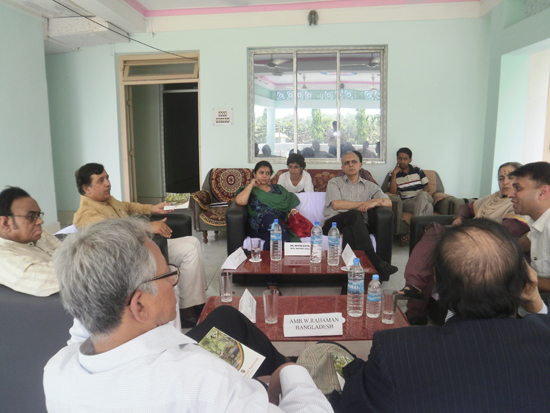
The bilateral visit was memorable and unfurled memories associated with the Liberation War which reinforced the historical ties that India and Bangladesh share. IDSA and BHF plans to initiate a joint project on India’s role in Bangladesh’s Liberation War while specially recording the role of Tripura during that period. Apart from a documentation section, this project intends to chronicle oral history and tap available local narratives on the subject, both in India and Bangladesh. IDSA will also be attempting to source any available unpublished work, along with contemporary research on the subject in a form of publication.
(Report prepared by Dr. Sreeradha Datta, Research Fellow, Institute for Defence Studies and Analyses, New Delhi.)
